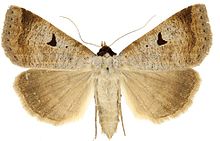Lygephila lusoria
| Lygephila lusoria | |
|---|---|

| |
| Female Lygephila lusoria lusoria | |

| |
| Male Lygephila lusoria lusoria | |
| Scientific classification | |
| Domain: | Eukaryota |
| Kingdom: | Animalia |
| Phylum: | Arthropoda |
| Class: | Insecta |
| Order: | Lepidoptera |
| Superfamily: | Noctuoidea |
| Family: | Erebidae |
| Genus: | Lygephila |
| Species: | L. lusoria |
| Binomial name | |
| Lygephila lusoria | |
| Synonyms | |
| |
Lygephila lusoria is a moth of the family Erebidae. The species was first described by Carl Linnaeus in his 1758 10th edition of Systema Naturae.[1] It is found in southern Europe, the Near East and Middle East, European south-eastern Russia, the Caucasus, Turkey and Israel.


There are two generations per year depending on the location. Adults are on wing from May to September.
The larvae feed on Vicia and Astragalus species.
Subspecies
- Lygephila lusoria lusoria
- Lygephila lusoria glycyrrhizae (Rambur, 1866) (Spain)
Lygephila amasina and Lygephila subpicata were previously treated as subspecies of Lygephila lusoria.
References
- ^ Yu, Dicky Sick Ki. "Lygephila lusoria (Linnaeus 1758)". Home of Ichneumonoidea. Taxapad. Archived from the original on March 4, 2016.
External links
- Fauna Europaea
- Lepiforum e.V. (in German)
- Kravchenko, V. D.; Müller, G.; Orlova, O. B.; Seplyarskaya, V. N. (2004). "The Catocalinae (Lepidoptera: Noctuidae) of Israel" (PDF). Russian Entomological Journal. 13 (3): 175–186. Archived from the original (PDF) on 2011-08-19 – via Internet Archive.
